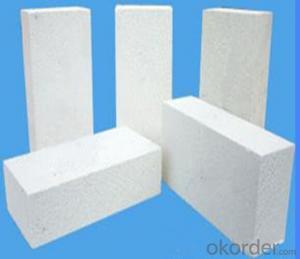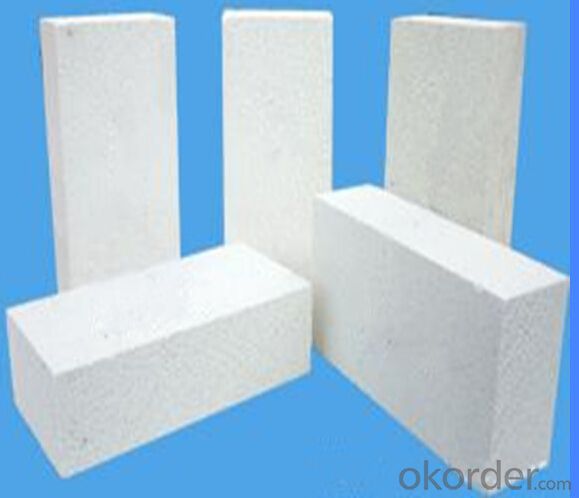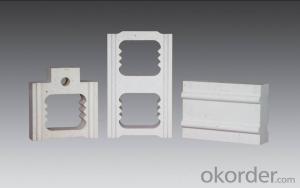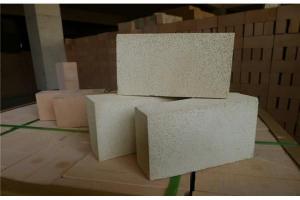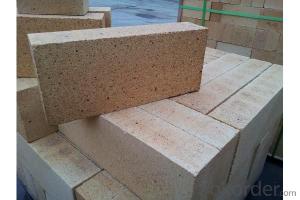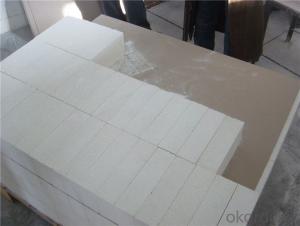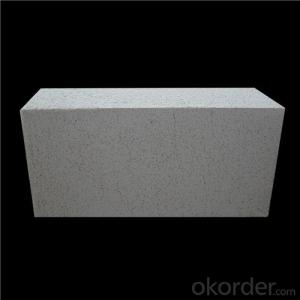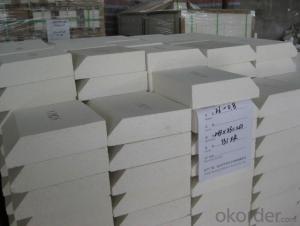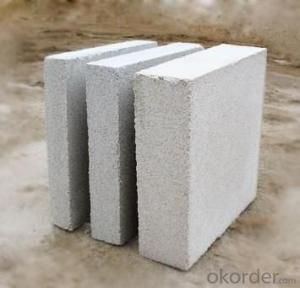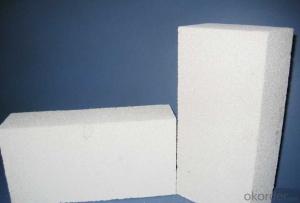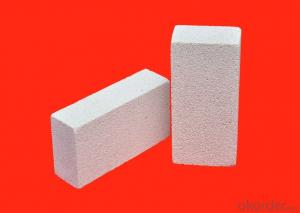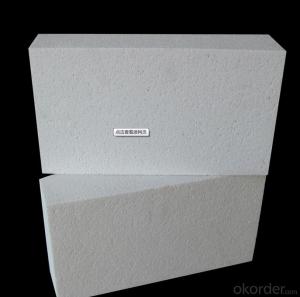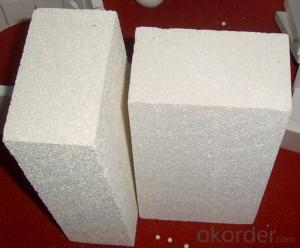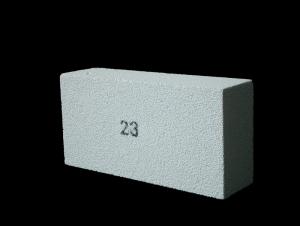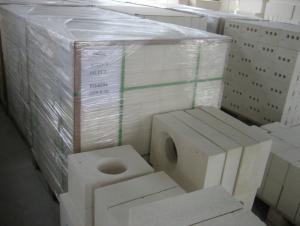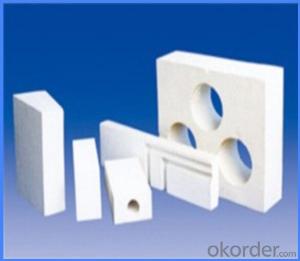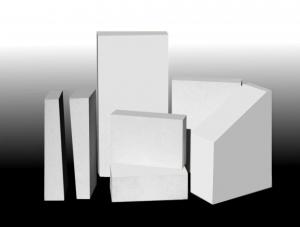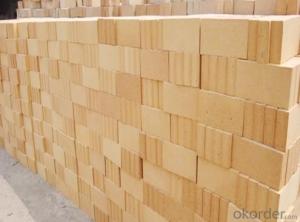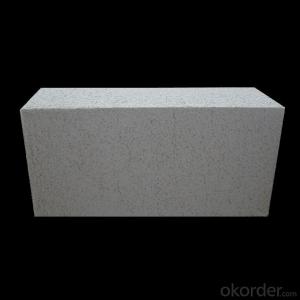Insulating Fire Brick - Refractory GJM Mullite Insulation Brick B-2
- Loading Port:
- Shanghai
- Payment Terms:
- TT OR LC
- Min Order Qty:
- 10 m.t.
- Supply Capability:
- 1000 m.t./month
OKorder Service Pledge
OKorder Financial Service
You Might Also Like
Specifications
mullite insulation brick
1. Low thermal conductivity
2.High hot compressive strength
3.Perfect Energy saving
Light weight mullite insulation furnace bricks refractory for sale
Advantage
1. Low thermal conductivity
2.High hot compressive strength
3.Perfect Energy saving
Description:
Lightweight mullite kiln bricks refractory for sale are made from good quality and superpure raw materials, with strictly classified fillings according to their grades. These fillings can form a uniform pore structure after burnt during the process of manufacture. Each grade of products has unique design to meet different thermal, physical and chomical demands.
Application:
Mullite insulation furnace bricks refractory material can be used in linings or heat-insulating materials of the industries, such as, ethylene pyrolysis furnaces, tubular furnaces, reforming furnaces of synthetic ammonia, gas generators and high-temperature shullte kilns, etc
Mullite Insulation furnace refractory material can be used as working lining, where contact with flames directly. This kind of brick can save the kiln energy very much
- Q: Can insulating fire bricks be cut to custom sizes?
- Indeed, custom sizes can be achieved when cutting insulating fire bricks. These bricks are commonly crafted from lightweight materials like ceramic fibers or lightweight aggregates, facilitating their relative ease of cutting. A range of tools, including saws, knives, and specialized cutting equipment, can be utilized to achieve this. However, it is crucial to prioritize proper safety measures and employ suitable tools and techniques to attain a precise and flawless cut. Furthermore, consulting the manufacturer's instructions or seeking expert guidance is recommended to ensure that the cutting procedure does not compromise the structural integrity or thermal characteristics of the insulating fire bricks.
- Q: Are insulating fire bricks suitable for insulation in steam boilers?
- Yes, insulating fire bricks are suitable for insulation in steam boilers. Insulating fire bricks are made from lightweight materials that have high insulating properties, such as alumina or silica. They are designed to withstand high temperatures and thermal shocks, making them ideal for use in steam boilers where there is constant exposure to heat. Insulating fire bricks have low thermal conductivity, which means they can effectively prevent heat transfer, reducing energy loss and increasing the efficiency of steam boilers. Their high insulation properties also help to maintain consistent temperatures within the boiler, preventing heat fluctuations and minimizing the risk of thermal stress and damage. Furthermore, insulating fire bricks are resistant to corrosion and chemical attacks, ensuring their durability and longevity in steam boiler applications. They are also easy to install and can be cut into different shapes and sizes to fit the specific requirements of the boiler. Overall, insulating fire bricks are an excellent choice for insulation in steam boilers due to their ability to withstand high temperatures, low thermal conductivity, and resistance to corrosion. They help in reducing energy loss, improving efficiency, and ensuring the longevity of the boiler.
- Q: Are insulating fire bricks resistant to insect infestations?
- No, insulating fire bricks are not specifically designed to be resistant to insect infestations.
- Q: Are insulating fire bricks resistant to water absorption?
- Yes, insulating fire bricks are resistant to water absorption. These bricks are specifically designed to have low porosity and high density, which helps prevent water from being absorbed into their structure. This resistance to water absorption is important because exposure to water can lead to cracking or damage in fire bricks, reducing their insulation properties and overall longevity. Therefore, insulating fire bricks are an ideal choice for applications where moisture resistance is required, such as in the construction of kilns, furnaces, or other high-temperature environments.
- Q: Can insulating fire bricks be used for insulation in steam boilers?
- Yes, insulating fire bricks can be used for insulation in steam boilers. These bricks are designed to withstand high temperatures and have excellent thermal insulation properties. They are commonly used in various applications that require insulation, including steam boilers. Insulating fire bricks are able to minimize heat loss and improve energy efficiency in steam boilers by providing a barrier that prevents heat transfer to the surrounding environment. Additionally, their lightweight and porous structure make them easy to handle and install in steam boilers. Therefore, insulating fire bricks are an ideal choice for insulation in steam boilers, as they help to enhance their performance and reduce energy consumption.
- Q: Do insulating fire bricks have good mechanical strength?
- Insulating fire bricks generally have moderate mechanical strength compared to regular fire bricks. While their main purpose is to provide excellent thermal insulation, they are still able to withstand some amount of mechanical stress. However, it is important to note that their mechanical strength may not be as high as other types of fire bricks, which are specifically designed to withstand heavier loads and abrasion. Therefore, if the application requires both high insulation and superior mechanical strength, it might be necessary to consider using a combination of insulating fire bricks and regular fire bricks to achieve the desired outcome.
- Q: Can insulating fire bricks be used in cement kilns?
- Yes, insulating fire bricks can be used in cement kilns. These bricks have high thermal insulation properties, which help in reducing heat loss and increasing energy efficiency in the kiln. Additionally, they can withstand high temperatures and provide effective insulation, making them suitable for use in cement kilns.
- Q: Can insulating fire bricks be used for insulation in oil refineries?
- Yes, insulating fire bricks can be used for insulation in oil refineries. Insulating fire bricks are designed to withstand high temperatures and provide excellent thermal insulation. They are made from lightweight refractory materials that have low thermal conductivity, allowing them to effectively minimize heat transfer. In oil refineries, where high temperatures and heat transfer are common, insulating fire bricks can be used to insulate various components such as furnaces, reactors, and pipelines. By using insulating fire bricks, the heat loss can be significantly reduced, improving energy efficiency and reducing operational costs in oil refineries.
- Q: Can insulating fire bricks be used in the construction of thermal insulation walls?
- Yes, insulating fire bricks can be used in the construction of thermal insulation walls. These bricks are designed to have low thermal conductivity, which helps to minimize heat transfer. They are widely used in applications where thermal insulation is required, including the construction of walls and other structures that need effective insulation against high temperatures.
- Q: Can insulating fire bricks be used in glass furnaces?
- Yes, insulating fire bricks can be used in glass furnaces. Insulating fire bricks are designed to have low thermal conductivity, which makes them ideal for use in high-temperature environments like glass furnaces. These bricks help to reduce heat loss from the furnace, resulting in improved energy efficiency and reduced operating costs. They also provide better insulation and help to maintain consistent temperatures inside the furnace, which is crucial for glass production. Additionally, insulating fire bricks have good resistance to thermal shock and can withstand the extreme temperatures and rapid temperature changes that occur in glass furnaces. Overall, the use of insulating fire bricks in glass furnaces can contribute to better furnace performance, increased productivity, and energy savings.
Send your message to us
Insulating Fire Brick - Refractory GJM Mullite Insulation Brick B-2
- Loading Port:
- Shanghai
- Payment Terms:
- TT OR LC
- Min Order Qty:
- 10 m.t.
- Supply Capability:
- 1000 m.t./month
OKorder Service Pledge
OKorder Financial Service
Similar products
Hot products
Hot Searches
Related keywords
